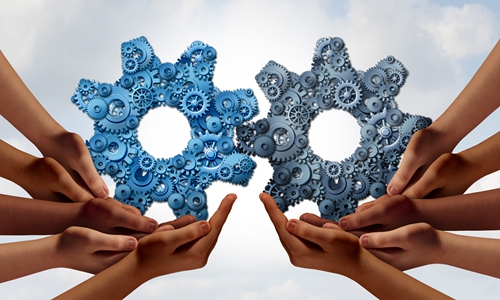Magnanimity, equity, and solidarity lead the pandemic path forward
Source:Global Times Published: 2020/6/12 17:13:40

Photo: IC
Editor's Note:The novel coronavirus pandemic is posing severe threats to not only life and public health, but also livelihood and socio-economic well-being of governments across the world. The Center for China and Globalization, a leading Chinese non-government think tank based in Beijing, organized an online forum on global cooperation to fight COVID-19 on Wednesday. What challenges and opportunities is the international community facing with respect to the battle over the pandemic? How shall these challenges be overcome or opportunities seized? The Global Times solicited opinions from three speakers about these topics.
Michele Geraci, former undersecretary of state at the Italian Ministry of Economic Development
Since the beginning of the novel coronavirus crisis, there has been a misunderstanding that health and economic issues were in conflict with each other. Governments around Europe were trying to find a balance between what we should look after first, health or economy. But those two goals are not in conflict with each other.
The example of Asian countries, including China, shows that early lockdown may be the right direction over helping the economy. They took a hit at the beginning within limited time and then were ready to restart. Perhaps this is a mistake that has been done in Europe. European countries are dragging the lockdown for longer time so the economy suffers more. With a late lockdown, a weak economic recovery.
There is not a crisis without opportunity. It would be a real waste not to use this crisis as an opportunity to have countries cooperate with each other much more. I support a bottom-up approach to expand international cooperation. Growing people-to-people relations and expanding exchanges in academic research will enhance cooperation between governments.
In order to allow governments to change their tune and lower the tensions, we need to build support from the bottom. As a professor and a researcher, I welcome activities that actually bring people exchanges.
I was one of the proponents of Italy joining the China-proposed Belt and Road Initiative (BRI) last year. The BRI is not just about trade, and we have added the road of culture. Now we have added the road of health. The BRI could surely be one of the examples that embodies how both countries can come together and lower their frictions.
The West is trying to understand the line between the role of the state and the role of the market. When the government role expands, some people misunderstand it as more protectionism and nationalism. If it's done well, a stronger government can make its citizens safer and economy a little bit better. A stronger management at the top will encourage governments to be more open to engage with their international partners. This is positive to launch a stronger government to make domestic society and economy stronger, which will push people to look more outward. It is not a protectionist trend, but the opposite, trying to bring back globalization.
A bigger role of the state may actually help to bring the world closer than ever, which is really what we need.
Laurence Brahm, founding director of Himalayan Consensus Institute (Nepal)
The value system in China is very much in support of the fight. China has traditional values of Confucianism which actually brings people together in collaboration rather than fighting. China has many departments which allowed people to recognize the need for immediate change and responsiveness to change. The Chinese government values every life. I think these principles have not been understood by the outside world. These guiding principles allowed the Chinese government to work in very close collaboration with the whole population. I think there's a need for more of this type of spirit internationally.
In the US, the epidemic has become totally politicized. We have to rise above this and have more collaboration internationally, not only for this pandemic but also for the next one and the next crisis. This is a time when we need to share these experiences and learn from each other rather than to have this decoupling of globalization. Now is the time for globalization in terms of healthcare, environment, and utilizing technology intelligently for this purpose.
We have so many lessons to learn about the importance of protecting every single life, not only from the perspective of health but also environment, which means getting back into real economics with actions for people's lives in a sustainable and continuous basis from the view of environment and healthcare; and not only from the perspective of capital market interests.
Anushka Prasad, founding director of China India Foundation (India)
What the biggest crisis in this pandemic is the crisis in leadership. What we ignore the most is humility, which allows us to recognize and accept. Just like people, states also cannot meet their needs on their own. Food supply lines, medical supplies, and climate are all connected. Even if I manage to protect myself from the virus or countries manage to protect themselves, we will still find ourselves vulnerable if others have not managed to control this virus. We are only as strong and as safe as our weakest link. We all must work together to ensure the weakest in our global community is safe. Humility and leadership also allow us to recognize our strengths and our own weaknesses, and be willing to admit and learn from both.
The US, which has led the rules-based system, should be really proud of what humanity has achieved, instead of potentially feeling tight by the rise of others. The US should continue with leadership to further adapt to the system for the challenges that we are facing today. Protectionism won't help tackling inequality, climate change, technology, and so on. All of these would require effective cooperation.
The powerful must recognize their biggest soft power tool is magnanimity. Take care of the weakest links, and we shouldn't create further weak links.
Posted in: VIEWPOINT